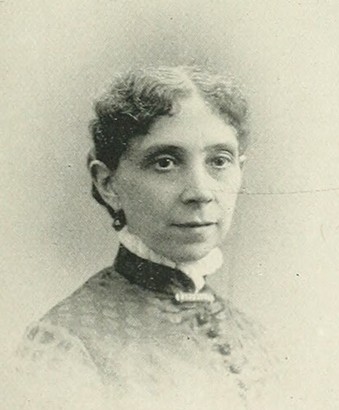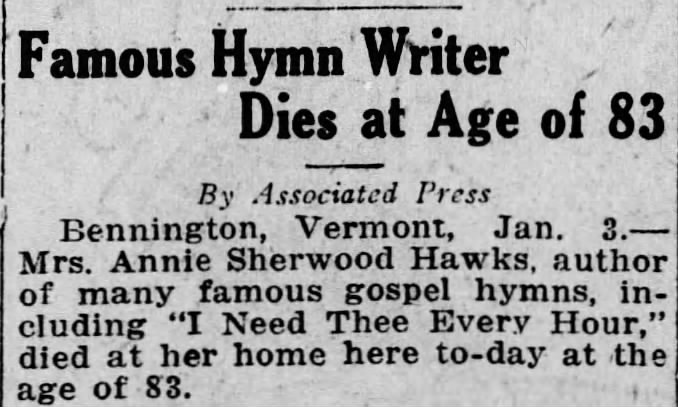Hymn History: I Need Thee Every Hour
Author: Annie Sherwood Hawks
“Suddenly, I became so filled with the sense of nearness to the Master that, wondering how one could live without Him, either in joy or pain, these words were ushered into my mind, the thought at once taking full possession of me – ‘I Need Thee Every Hour …’”
(Annie Sherwood Hawks)
The Origin of the Hymn “I Need Thee Every Hour”
Among the beloved hymns of Christian devotion, few have expressed human dependence upon God as simply and tenderly as “I Need Thee Every Hour.” Written in the mid-nineteenth century, this hymn has carried believers through moments of trial, peace, and worship, offering words that confess continual need for the presence and guidance of the Lord. Its origin lies in a moment of quiet reflection by a young woman, paired with a melody shaped by a gifted church musician, and its story illustrates how deeply personal experiences can resonate across generations.
Annie Sherwood Hawks: The Lyricist
The text of “I Need Thee Every Hour” was written by Annie Sherwood Hawks (1835–1918), a poet and homemaker from Brooklyn, New York. Hawks displayed a talent for poetry from an early age, contributing verses to local newspapers even as a teenager. After her marriage to Charles Hawks, she continued to write, balancing her literary pursuits with the responsibilities of family life.
Though Hawks never sought public recognition, her natural gift for verse found encouragement in her local Baptist congregation, Hanson Place Baptist Church, where she came under the influence of the pastor and noted hymnwriter Robert Lowry. Lowry’s guidance would prove instrumental in bringing Hawks’s poetry into the realm of hymnody.
Hawks later described the inspiration for “I Need Thee Every Hour.” On a quiet June morning in 1872, while going about her household duties, she suddenly felt a profound sense of God’s presence in her life. Reflecting on how every hour brought with it new needs and opportunities for divine help, she sat down and quickly penned the lines that would become the hymn. She recalled:
“One day as a young wife and mother of 37 years of age, I was busy with my regular household tasks, when suddenly I became so filled with the sense of nearness to the Master that, wondering how one could live without Him, either in joy or pain, these words, ‘I Need Thee Every Hour,’ were ushered into my mind, the thought at once taking full possession of me.”
Her words flowed naturally, not out of suffering or crisis, but from a recognition of continual dependence on God in daily life.
Robert Lowry: The Composer
After writing the text, Hawks showed it to her pastor, Robert Lowry (1826–1899), who immediately recognized its spiritual power. Lowry, already known for hymns such as “Shall We Gather at the River?” and “Low in the Grave He Lay,” set the words to music. His tune, tender and flowing, perfectly matched the quiet earnestness of Hawks’s verses. Lowry also added the refrain, “I need Thee, O I need Thee; every hour I need Thee,” which reinforces the theme of dependence and gave the hymn a memorable congregational quality.
The hymn was first introduced at the National Baptist Sunday School Association meeting in Cincinnati, Ohio, later in 1872. It was warmly received and soon spread across Baptist and other evangelical churches.
Reception and Use
The hymn’s appeal lay in its simplicity. Unlike hymns that focus on dramatic conversion or stirring victory, “I Need Thee Every Hour” speaks in gentle, universal terms. Every Christian, regardless of circumstance, can echo its confession of need for God’s presence and guidance. Whether in joy or sorrow, in strength or weakness, the truth of its message resonates.
By the late nineteenth century, the hymn had found a place in major American hymnals and was sung widely in revival meetings, prayer gatherings, and church services. Its emphasis on continuous dependence made it especially suitable for moments of personal consecration or quiet devotion.
Later Reflections by Hawks
Annie Hawks lived to see her hymn become a favorite across America. Looking back, she expressed gratitude for how God had used her simple words:
“I did not understand at first why this hymn so greatly touched the throbbing heart of humanity. It was not until years later, when the shadow fell over my way—the shadow of great loss—that I understood something of the comforting power in the words which I had been permitted to give out to others in my hour of sweet serenity and peace.”
Thus, though written in a time of joy, the hymn took on new depth of meaning for Hawks during later trials. She discovered, as many believers have, that the words apply equally in both calm and storm.
Legacy
Today, “I Need Thee Every Hour” remains a treasured hymn of the church. It has been included in countless hymnals, sung in times of revival and in quiet bedside devotion, and recorded by many artists. Its enduring power lies in its universal truth: every believer, regardless of age or circumstance, can join in its prayer.
The hymn’s origin reminds us that some of the most enduring expressions of faith are not born from grand events or famous pulpits, but from the daily life of ordinary believers. Annie Hawks, in her Brooklyn home, gave voice to a need that spans centuries and cultures. With Robert Lowry’s musical setting, her words have found their way into the hearts of millions.
Conclusion
The story of “I Need Thee Every Hour” illustrates the beauty of simple dependence upon God. Annie Sherwood Hawks, inspired during a quiet moment in her home, wrote words that have become a universal prayer. Robert Lowry’s tune gave those words life in song, and together they produced a hymn that continues to remind Christians that every hour, in joy or in sorrow, they need the presence and guidance of their Lord.
_____
Image Source/Credit (in order):
- Public domain, via Wikimedia Commons
- Newspapers.com, Harrisburg Telegraph, January 3, 1918, https://www.newspapers.com/article/harrisburg-telegraph/191449381/
Related
Sorry, no records were found. Please adjust your search criteria and try again.
Sorry, unable to load the Maps API.

